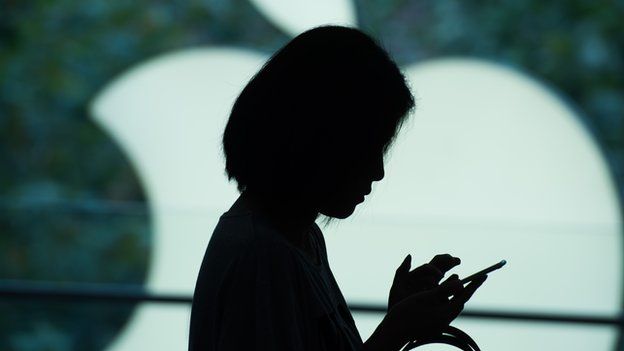Apple faces US appeal to force it to unlock iPhone
- Published

US authorities are appealing against a judge's decision not to order Apple to unlock an iPhone in a drugs case.
The Justice Department is relying on the same law as the one in its fight with Apple over the encrypted phone belonging to the San Bernardino gunman.
It has gone to a higher court after a Brooklyn judge said he had no power to give the order.
Apple said the order would be the start of a "slippery slope that threatens everyone's safety and privacy".
In the original hearing, the US government asked Judge James Orenstein to order Apple to open up a locked phone belonging to Jun Feng, who has pleaded guilty to participation in a methamphetamine distribution conspiracy. The Justice Department wants to use the device to find any of his co-conspirators.
After Judge Orenstein's decision last week, the government resubmitted its arguments to a higher judge overseeing the matter.
While the case has similarities with that being heard in California in relation to the San Bernardino shootings, the New York case involves an older version of Apple's operating system. Feng's phone uses iOS 7, which is not protected by the same encryption technology.
"Apple has the technological capability to bypass the passcode feature and access the contents of the phone that were unencrypted," the Justice Department said in its court filing, submitted on Monday. It has asked District Court Judge Margot Brodie to hear the case. The Justice Department's lawyers called the request routine, arguing that the case was neither about asking Apple to do anything new, nor to create a "master key" to access all iPhones.
'Slippery slope'
The government said Judge Orenstein's ruling was an "unprecedented limitation on" judicial authority and that his legal "analysis goes far afield of the circumstances of this case". It also stated that the government "does not have any adequate alternatives" to obtaining Apple's assistance because attempting to guess the passcode would trigger the phone's auto-erase security feature.
Federal prosecutors cited several examples in which Apple has extracted data from a locked device under the law. Apple argues that it has opposed requests to help extract information from more than a dozen iPhones since being invited to challenge the government's use of the 1789 All Writs Act by Judge Orenstein in October last year.
The technology firm said it agreed with Judge Orenstein's ruling that granting the request would "thoroughly undermine fundamental principles of the constitution". It said: "We share the judge's concern that misuse of the All Writs Act would start us down a slippery slope that threatens everyone's safety and privacy."
- Published29 February 2016
- Published25 February 2016
- Published21 October 2015